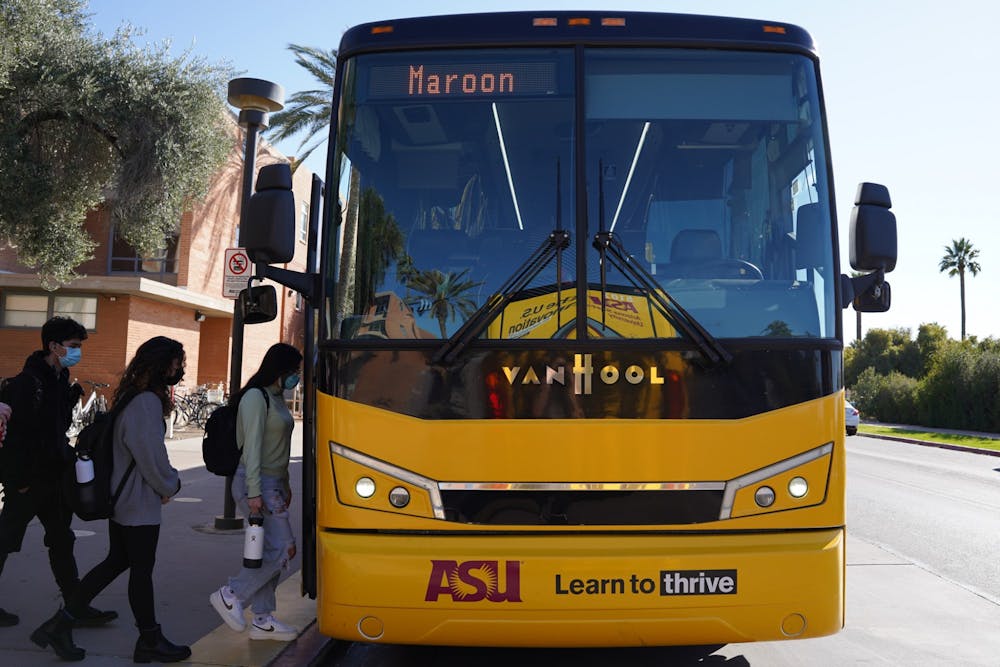As cities across the Valley experiment with electric bus routes, ASU is hitting the brakes on transitioning from diesel to electric, with officials citing performance and price concerns as the main deterrents.
The cities of Phoenix and Tempe are trying to convert their bus fleets to low emission and zero-emission fuel sources to reduce greenhouse gas emissions. Both have tested electric buses on routes in 2020 and the cities are partnering to get federal funding necessary to officially implement the technology.
Last month, Phoenix City Council expanded the Green Transit Pilot Program that allows the Public Transit Department to enter into a $150 million contract over five years with companies that can provide cleaner alternatives to diesel buses, like electric hybrid and battery electric.
Promoting green transportation is part of Phoenix's climate action goals. According to city documents, 46% of Phoenix's greenhouse gas emissions come from transportation, and the city is attempting to curb those emissions by using low emission and zero-emission transportation.
Money, money, money
Cost concerns stand in the way of the University electrifying its shuttle fleet.
ASU's buses are CX45 Van Hools, which use diesel fuel, that it contracts through Arrow Stage Lines.
Switching to electric buses would double the shuttle service expenses, said University spokesperson Jerry Gonzalez in an emailed statement.
The upfront cost of the electric buses is pricier than diesel and compressed natural gas buses.
In 2020, two brands of electric buses were tested by Valley Metro, the transportation conglomerate in Phoenix, and both cost around $800,000, which is around $300,000 more than CNG buses.
Consumers are wary about purchasing electric buses because of how quickly the technology is changing. Some consumers might wait on buying the latest models anticipating they could be obsolete in the near future, according to Steven Polzin, research professor at ASU.
"There's some risk in being on the cutting edge on some of these technology investments that are changing real fast," Polzin said. "The risk is that the newer batteries are so much better that you've got, in fact, buyer's remorse that you're stuck with a vehicle that might not be optimal or current as long as you'd like."
Phoenix and Tempe use CNG buses as a cheaper alternative to electric. Last month, Phoenix City Council approved a contract for the Department of Transit to purchase no more than 40 CNG buses in the next year from Gillig, LLC.
CNG buses, which have engines that operate the same way as gasoline engines but use natural gas, are already in cities across Arizona because they provide an alternative to diesel-fueled buses.
"Compressed natural gas is a much cleaner fuel," said Samuel Stevenson, interim transit manager at City of Tempe. "It's just not entirely zero emissions."
Infrastructure costs, like charging stations, would also add to the University's price tag if it switched to electric buses.
A Valley Metro report showed charging infrastructure costs Arizona cities an estimated $200,000 per electric bus.
Even if the proper infrastructure was in place, electric buses need time to charge, and ASU buses only have a small time frame to refuel at night, which might not be enough for electric buses.
"The fact that the shuttles are only down four hours each night to refuel also contributes to this limitation," Gonzalez said in the email.
Mileage matters
When battery life and ASU's bus route requirements are taken into consideration, electric buses still do not have what it takes to meet the University's needs.
ASU buses operating on the West Express travel from Glendale to Tempe, a roughly 25 mile trip, every hour. This route operates 10 hours a day, meaning ASU buses on the route travel around 250 miles each day.
The electric bus's maximum range tested by Valley Metro in the summer of 2020 is a far cry from that number.
Valley Metro tested two 35-foot electric buses from the companies New Flyer and Proterra on ASU's Flash route. Even though testing day temperatures hovered around 100 degrees, which significantly hampered battery life, the Proterra bus achieved a maximum range of 152 miles, and the New Flyer bus reached 181 miles.
The current technology does not meet ASU's needs, Gonzalez said.
However, the tests run by Valley Metro show electric buses' maximum range has increased over the years as battery technology improves, and it is sufficient for some of Valley Metro's routes, according to Stevenson.
Electric bus batteries have improved over time because of changes made to the battery's chemistry and to the battery charging systems, which lengthens the battery’s life and durability, Polzin said.
Switching to electric transportation does more than just cut down on a city's greenhouse gas emissions, it also cuts down on noise pollution and promotes a feeling the community is doing something to solve climate change, according to Tony Belleau, Tempe streetcar project manager.
"We recognize that we are doing our part as a municipality in a region that certainly feels the effects of climate change and is aware of the impact on our populations," Belleau said. "So for a broader pressure in the right direction, I think that is something folks are beginning to realize.”
Even though the University has shelved the idea of going electric, Tempe, Phoenix and Valley Metro plan to keep applying for federal funding to support electric buses, even though the latest application was rejected.
"We haven't given up, and we're not going to," Stevenson said.
Reach the reporter at kryback1@asu.edu and follow @KadenRyback on Twitter.
Like The State Press on Facebook and follow @statepress on Twitter.

Kaden is a reporter for the Biztech desk, focusing on student run business, people profiles and research papers. During his time at The State Press, Kaden's biggest piece was about ASU's history with NASA. He's a sophomore majoring in Journalism and Mass Communication.




